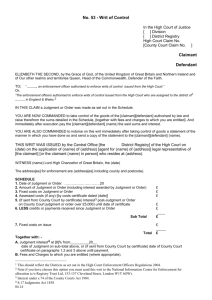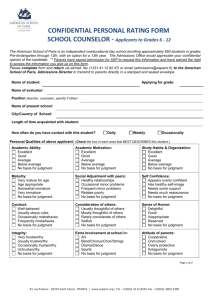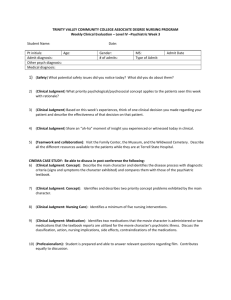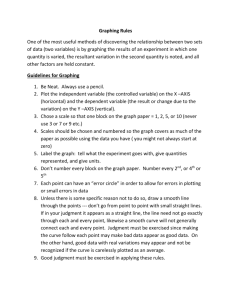Article 6. Small Claims Procedure - Lesotho Legal Information Institute
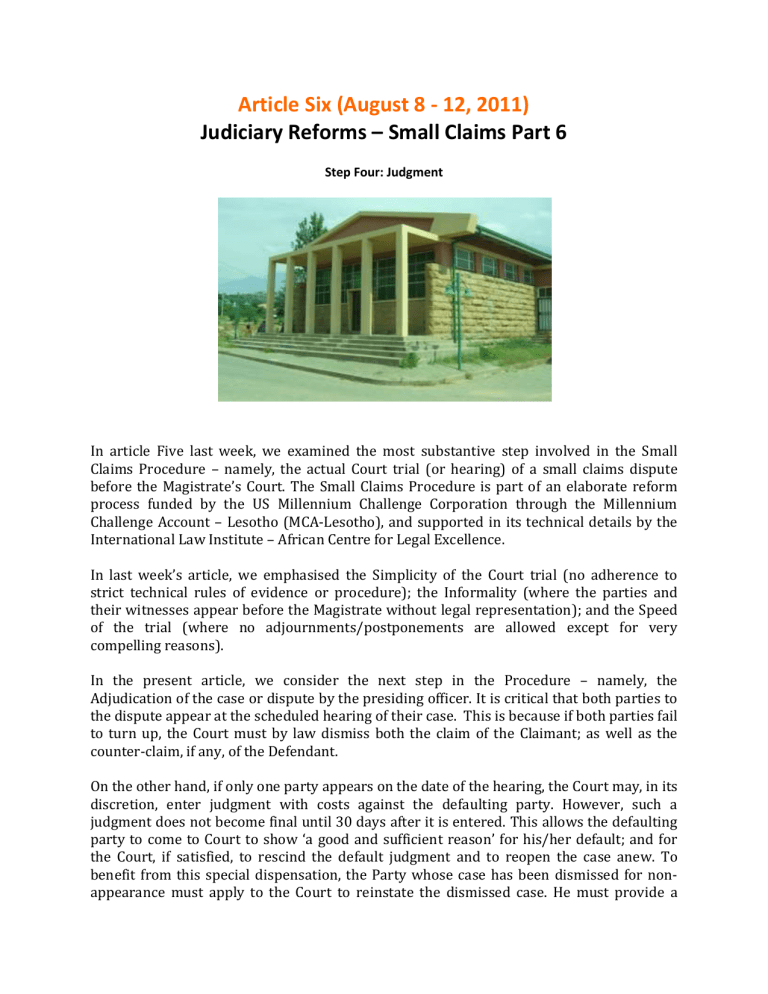
Article Six (August 8 - 12, 2011)
Judiciary Reforms – Small Claims Part 6
Step Four: Judgment
In article Five last week, we examined the most substantive step involved in the Small
Claims Procedure – namely, the actual Court trial (or hearing) of a small claims dispute before the Magistrate’s Court. The Small Claims Procedure is part of an elaborate reform process funded by the US Millennium Challenge Corporation through the Millennium
Challenge Account – Lesotho (MCA-Lesotho), and supported in its technical details by the
International Law Institute – African Centre for Legal Excellence.
In last week’s article, we emphasised the Simplicity of the Court trial (no adherence to strict technical rules of evidence or procedure); the Informality (where the parties and their witnesses appear before the Magistrate without legal representation); and the Speed of the trial (where no adjournments/postponements are allowed except for very compelling reasons).
In the present article, we consider the next step in the Procedure – namely, the
Adjudication of the case or dispute by the presiding officer. It is critical that both parties to the dispute appear at the scheduled hearing of their case. This is because if both parties fail to turn up, the Court must by law dismiss both the claim of the Claimant; as well as the counter-claim, if any, of the Defendant.
On the other hand, if only one party appears on the date of the hearing, the Court may, in its discretion, enter judgment with costs against the defaulting party. However, such a judgment does not become final until 30 days after it is entered. This allows the defaulting party to come to Court to show ‘a good and sufficient reason’ for his/her default; and for the Court, if satisfied, to rescind the default judgment and to reopen the case anew. To benefit from this special dispensation, the Party whose case has been dismissed for nonappearance must apply to the Court to reinstate the dismissed case. He must provide a
2 good reason (cause) for his having failed to appear in Court the first time; and he will be required to pay a fee (of not more than M250) for the reinstatement of each claim or counter-claim. If dissatisfied with the final default judgment, the party may lodge (i.e. seek) a review of that judgment before a higher Magistrate’s court.
In the more ordinary case, where both parties appear in Court, the Presiding Officer will enter judgment after the trial. The judgment will be entered either for the Claimant or the
Defendant – upon satisfactory proof of the Claimant’s claim; or proof of the Defendant’s defence, or of the Defendant’s counter-claim, if any. If neither party is able to prove his/her case, the Presiding Officer enters a judgment of ‘absolution’ (i.e. freeing either party from the claim of the other). This is done only if it appears to the Court that the total evidence produced does not justify a judgment for either the Claimant or the Defendant.
The judgment may include the costs (i.e. expenses) incurred by the winning party. Such expenses include the court fees, messenger fees, herding fees, travel expenses, and the expenses incurred by the party in calling or subpoenaing the witnesses as well as in bringing them to Court. Normally, such witness expenses comprise transport, subsistence allowances, accommodation, food, etc. Alternatively, the Court may apportion these costs between the Parties, in such proportions as it deems just.
A party against whom a final judgment has been entered may appeal the judgment. He/she must do so within 30 days from the date of that judgment, by filing the appeal with the
Clerk of Court together with supporting grounds (reasons). He/she pays a modest appeal fee, messenger’s fee, plus a nominal amount of security determined by the Clerk of Court.
Again, to underscore the simplicity, flexibility and economy of the Small Claims Procedure, the appellant may appeal to the Presiding Officer of the Court, to reduce even this nominal amount of the security for the appeal.
For further information, please contact the Magistrates’ Court
P.O. Box 354
Maseru 100
Lesotho
Tel: +266 22 32 11 51
(Next week, another step in the Small Claims process will be reviewed)

